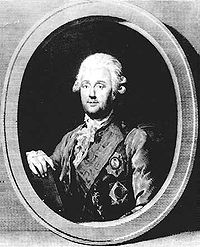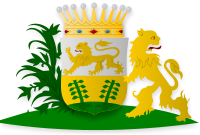- Otto Magnus von Stackelberg (ambassador)
-
For other people named Otto Magnus von Stackelberg, see Otto Magnus von Stackelberg (disambiguation).
Reichsgraf Otto Magnus von Stackelberg (1736–1800) was a diplomat of the Russian Empire, an envoy in Madrid from 1767 to 1771, ambassador in the Polish-Lithuanian Commonwealth from 1772 to 1790 and in Sweden from 1791 to 1793.
After the treaty of the First Partition, signed in February, was made public on 5 August 1772, Otto Magnus von Stackelberg became the new ambassador to Poland.[1] During his stay in Warsaw, due to the Russian Empire's influence in the Commonwealth, he was almost the de facto ruler of Poland in the name of Empress Catherine II who became a protectress of this country. He governed Poland by Permanent Council, which became an instrument of Russian surveillance over the Commonwealth.
His first task was to ensure that the Polish parliament (Sejm) would ratify the treaty. The Partition Sejm, with many of its deputies coerced or bribed by the Russian embassy, indeed ratified the treaty (on 30 September 1773), as well as established the Permanent Council - a small body that both promised to reform the inefficient Polish governance and which could be easily controlled by Russia. In 1773 King Stanisław August Poniatowski bestowed him Order of the White Eagle.
In 1776, Stackelberg permitted Polish King Stanisław August Poniatowski to carry out several minor reforms,[2] but in 1780 von Stackelberg's protest resulted in the derailing of Zamoyski's Codex, a proposed set of reforms drafted by kanclerz Andrzej Zamoyski which would have strengthened royal power, made all officials answerable to the Sejm, placed the clergy and their finances under state supervision, and deprived landless szlachta of many of their legal immunities. Russia did not want a completely governmentless Poland, as was seen in their support for the Permanent Council, yet the Zamoyski Codex, which offered a chance for the significant reform of the Polish governance, was not in Russia's interest; Russia wanted a weak buffer Poland on its borders - not a strong rival as two centuries before. For that reason Stackelberg also opposed most reforms proposed by Poniatowski from 1778 to 1786.[2]
On 27 May 1787, he derailed yet another Polish policy which seemed threatening to Russia. With few major wars in the past decades, the economy of the Commonwealth was improving, and its budget had a notable surplus. Many voices said that the money should be spent on increasing the size, and providing new equipment for, the Polish army. However, as a large Polish army could be a threat to the Russian garrisons controlling Poland, von Stackelberg ordered his proxies in the Permanent Council to spent the money on a different goal: for the huge sum of 1 million zloty's (representing most of the surplus), the Council bought the von Brühl's Palace - and promptly donated it to 'Poland's ally', Russia, to serve as Russia's new embassy.
Nonetheless, von Stackelberg, and the entire Russian control over Poland, was soon to suffer a major defeat. With Russian attention being diverted to the Russo-Turkish War, 1787-1792 and the Russo-Swedish War (1788-1790), Catherine approved some limited reforms in Poland, with the goal of transforming Poland into a more useful (and efficient) ally.[2] However when the opportunity for major reform presented itself during the "Great" or "Four-Year Sejm" of 1788–1792, which opened on 6 October 1788, and from 1790 — a new alliance between the Polish-Lithuanian Commonwealth and Prussia seemed to provide even further security against Russian intervention,[3] the Polish reformers managed to carry out increasing numbers of reforms despite Stackelberg's opposition.[4]
His failure to prevent those reforms was one of the reasons he was recalled by St. Petersburg and reassigned to Sweden, where he became the Russian ambassador from 1791 to 1793.
See also
References
- ^ Butterwick, Richard (1998). Poland's Last King and English Culture: Stanislaw August Poniatowski (1732–1798). Oxford University Press. ISBN 0198207018. http://books.google.com/books?vid=ISBN0198207018&id=ySzrq3JwjBEC&pg=PA246&lpg=PA246&dq=Stackelberg+Poland&sig=N7nq00sbb2Nzl4RlEIoSQxryHVE. Retrieved 2007-12-15.
- ^ a b c Stone, Daniel (2001). The Polish-Lithuanian State, 1386-1795. University of Washington Press. ISBN 0295980931. http://books.google.com/books?vid=ISBN0295980931&id=LFgB_l4SdHAC&pg=PA275&lpg=PA275&dq=Stackelberg+Poland&sig=tdYfNGU-iy7xVCFcaaC4snZ8NmI. Retrieved 2007-12-15.
- ^ Wandycz, Piotr Stefan (2001). The Price of Freedom: A History of East Central Europe from the Middle Ages to the Present. UK: Routledge. pp. 128. ISBN 0415254914. http://books.google.com/books?ie=UTF-8&vid=ISBN0415254914&id=vdS_WBHGBcYC&pg=PA128&lpg=PA128&dq=Polish-Lithuanian+Commonwealth+%22constitutional+monarchy%22&sig=58rJw1kZ92r6M7GxqSSHZd6eAFo. Retrieved 2007-12-15.
- ^ Schroeder, Paul W. (1994). The Transformation of European Politics, 1763-1848. Oxford University Press. ISBN 0198221193. http://books.google.com/books?vid=ISBN0198206542&id=BS2z3iGPCigC&pg=PA74&lpg=PA74&dq=Stackelberg+Poland&sig=YSsqP089_-MdvEuyUEo59bQU-Sc. Retrieved 2007-12-15.
- Zamoyski, Adam (1994). The Polish Way: a Thousand-Year History of the Poles and Their Culture. New York: Hippocrene Books.
Categories:- Recipients of the Order of the White Eagle (Poland)
- Recipients of the Order of Saint Stanislaus
- 1736 births
- 1800 deaths
- Russian diplomats
Wikimedia Foundation. 2010.


